
The family Fulgoridae is a large group of hemipteran insects, especially abundant and diverse in the tropics, containing over 125 genera worldwide. They are mostly of moderate to large size, many with a superficial resemblance to Lepidoptera due to their brilliant and varied coloration. Various genera and species are sometimes referred to as lanternflies or lanthorn flies, though they do not emit light.

Eurybrachidae is a small family of planthoppers with species occurring in parts of Asia, Australia and Africa. They are remarkable for the sophistication of their automimicry.

Pyrops is a genus of planthoppers that occur primarily in southeast Asia, containing about 70 species. They are fairly large insects, with much of the length due to an elongated, upcurving, snout-like projection of the head. The wings are generally brightly patterned in contrasting colors, and they are popular among collectors.

Ricaniidae is a family of planthopper insects, containing over 400 species worldwide. The highest diversity is in tropical Africa and Asia and in Australia, with a few species occurring in the Palearctic and Neotropical realms. It is one of the smaller families in the planthopper superfamily Fulgoroidea.

The subfamily Aphaeninae is a group of hemipteran insects, especially abundant and diverse in the tropics. They belong to the Fulgoridae (fulgorids), though they are not among the better-known members of that family that are called "lantern bugs" or "lanternflies". In 2009, the first molecular analysis of the Fulgoridae challenged the existing structure of eight currently recognized subfamilies and eleven tribes.
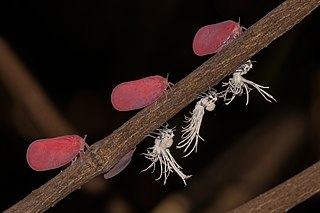
Flatidae are a family of fulgoroid planthoppers. They are cosmopolitan in distribution and are distinguished from others in the superfamily by a combination of characters. Like all other planthoppers, they suck phloem sap of plants. Some species are known to communicate with vibrations through the plant stems. Communication may be with mates, or with ants that tend the nymphs, protecting them and gathering honeydew secretions. Adults of some species have brightly coloured forewings which are tougher and known as tegmina unlike the membranous hindwings which are used for flight. Although a few can be identified by their coloration, most species requires dissection and examination under a microscope with access to literature on already described species.

Penthicodes is a genus of planthoppers belonging to the family Fulgoridae, subfamily Aphaeninae: found in South-East Asia.

Bythopsyrna is a genus of planthoppers belonging to the family Flatidae.
The Elicini are a tribe of planthoppers in the family Tropiduchidae. The type genus is Elica.

Pyrgomorpha is the type genus of grasshoppers in the family Pyrgomorphidae and the tribe Pyrgomorphini. Species are found in Southern Europe, Africa and the middle East, through to India and Mongolia.
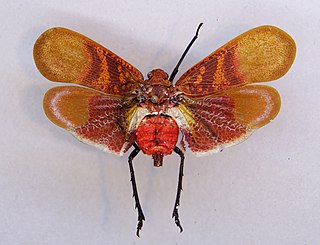
Scamandra is a genus of planthoppers in the subfamily Aphaeninae (Fulgoridae): found in Malesia.

Hemisphaerius is a genus of bugs in the family Issidae and tribe Hemisphaeriini. Species resemble the closely related Gergithus: but are differentiated in this genus by the size of the frons and shorter legs.

The Flatinae are a subfamily of planthoppers, erected by Maximilian Spinola in 1839. Genera have been recorded from all continents except Antarctica: especially in tropical and subtropical regions.
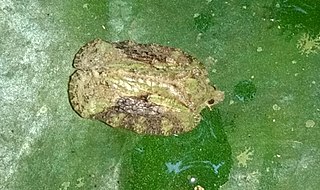
Atracis is a genus of flatid planthopper with around 60 species distributed in the Oriental Realm and tropical Africa.

Euricania is a genus of true bugs belonging to the family Ricaniidae.
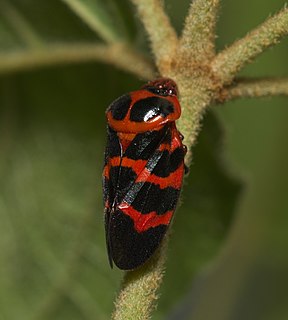
Cosmoscarta is a genus of froghoppers found in the Indo-Malayan region. Many of the species are boldly marked in black and red or yellow. A few species are of economic importance as they can cause injury to plants under cultivation.
Tropiduchus is a genus of planthoppers, recorded from Africa and Malesia.
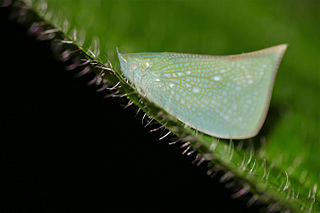
Lawana is a genus of planthoppers in the family Flatidae, erected by William Lucas Distant in 1906. In 1923, Leopold Melichar confirmed placement of this genus in tribe Flatini and subtribe Lawanina. Species are recorded from tropical Africa and Asia.















